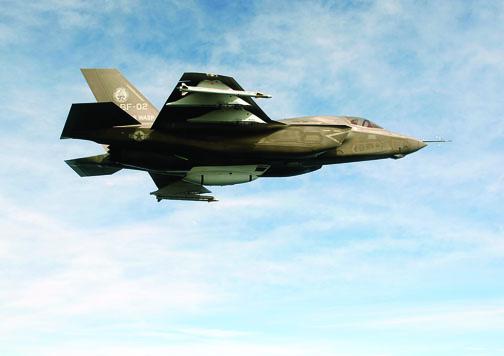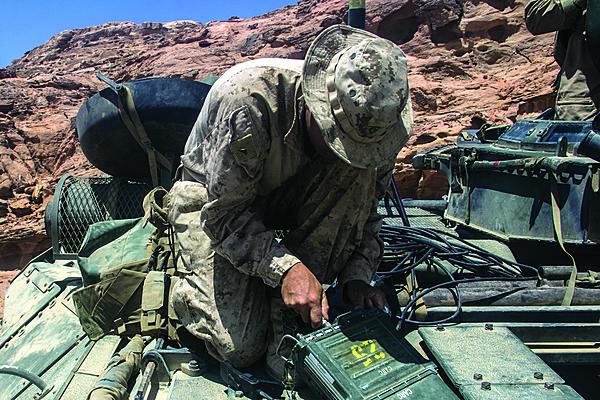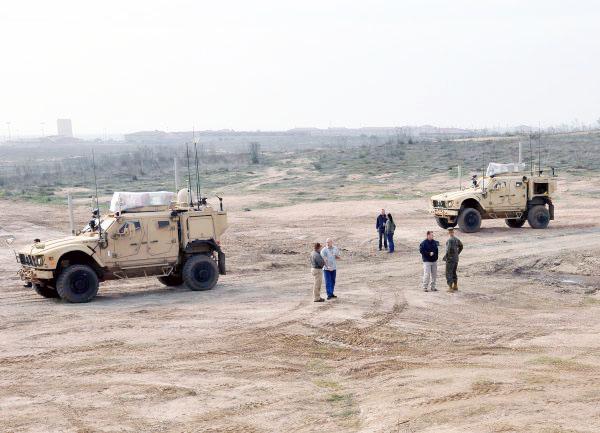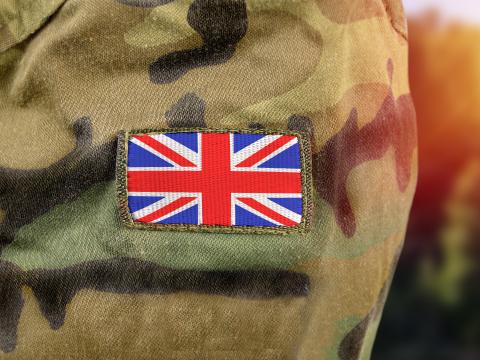Seeking a Role in Marine Corps Cyber
A tactical technology support organization that has been serving the U.S. Marines for decades is beginning to find a role in the cyber domain. The group offers a broad range of services, including test and evaluation, engineering and network integration. It also supports users across the Defense Department, U.S. government and allies.
No definitive cyber role has yet been carved out for the Marine Corps Tactical Systems Support Activity (MCTSSA), Camp Pendleton, California, but the team has skills to offer, says Michael Canterbury, MCTSSA technical director. “When you look at the emphasis on cyber, I think there’s clearly a role for us in the networking world. And when I say networking, I mean everything from the physical layer—how things communicate—to the applications that support network operations and network security. I think we can grow in that area,” Canterbury indicates. “We’re not the organization responsible for network operations or maintaining garrison networks or anything like that. But when it comes to understanding tactical networks and assisting in that area, we certainly can help.”
MCTSSA already is engaged in technically focused support to Marine Corps Forces Cyber Command, offering network engineering and training expertise. “We’re supporting the cyber terrain architecture effort. A small team is out walking the ground on the base, post and station networks and actually looking at how those networks are set up and employed,” he says. The information captured will provide a picture of the as-is architecture and will be useful for a wide range of architecture efforts in the future, he adds.
MCTSSA also has a role to play in Marine Corps efforts related to the Next Generation Enterprise Network (NGEN), the Consolidated Afloat Networks and Enterprise Services (CANES) program and the Joint Information Environment (JIE). “We’re an engineering organization, so we’re very interested, as the CANES architecture evolves, with how the Marine applications that are currently employed are going to be hosted with CANES. We’ve had a couple of planning meetings. We’re on a couple of integrated process teams working CANES from a technical perspective,” Canterbury reports. “Previously, we were involved in at least one of the early adopter system integration tests with CANES. It’s an evolving relationship we have with that program.”
MCTSSA personnel also are on integrated process teams for NGEN and have been supporting the NGEN program office directly. “Our focus to date has been on test and evaluation and providing technical support as required,” he reveals.
The organization is becoming involved with the JIE as well. “Currently, we have a couple of engineers just starting to be involved with support of JIE. We’ve been down and talked to the JIE principals. Overall, our role is primarily on the technical side looking at the network infrastructure, looking at where applications are hosted and so forth,” Canterbury says.
Other changes include the development of a new laboratory. “We had a young captain come in with the idea of starting a network efficiency lab for things like wide area network optimization, how to make better use of our wide area network bandwidth and possibly save money in terms of the commercial bandwidth that we purchase,” Canterbury explains.
MCTSSA officials responded by putting together a concept paper and providing initial funding. The intent was twofold: to gather data, profile the wide area network traffic and figure out how to gain efficiencies; and to prove the fidelity of testing by putting real-world traffic loads on the networks as they were being tested. “Once they built this knowledge base, they became the go-to team for any questions on network engineering,” he says. The team now supports some major programs of record in isolating problems to figure out if something is going on with the network. “It’s a small team in high demand because everything comes down to the network, it seems. I think that’s a key area where we can focus and grow,” he predicts.
MCTSSA also houses a radio frequency engineering laboratory, which has existed for a while but now has an evolving mission with the widespread deployment of software-defined radios. “Recognizing that the radios being fielded are network-capable, that brings the networking challenge. The knowledge base that our guys have built allows us to engage in development testing on the radios and then provide some help to the operating forces on how to effectively deploy these radios,” he remarks.
In addition, MCTSSA provides deployed technical support for Marine and joint service command, control, computer and communications (C4) systems throughout the acquisition life cycle. The organization has been deploying small teams on average of once or twice a year to support the Marine Expeditionary Forces (MEFs) in the combat theater. They can be deployed when needed for specific tasks, such as assisting with software applications and network engineering. “Our teams go out there a lot. They assist in getting the systems set up and deployed, and they also provide over-the-shoulder training to the Marines in theater, helping to the point that the Marines can sustain the systems on their own,” he explains. “The teams are task organized based upon the needs of the MEF forward.”
And as the MEFs rotate in and out of theater, MCTSSA teams help smooth the transition. “Whenever there’s a turnover from one MEF to another, we help get the new organization up to speed or help them resolve any problems,” Canterbury offers. With the war winding down, however, that particular role likely will end soon. “I think we’ll probably send our last team out this year,” Canterbury states.
MCTSSA supports deployed forces in other ways, as well. “Another thing that is available is the Operating Forces Tactical Systems Support Center. It is basically a reachback site.” This call center is available around the clock so that units can call and talk directly to an analyst to resolve problems, Canterbury notes.
Additionally, the group recently made its Knowledge and Incident Management System database more readily available to warfighters. The database previously had been hosted on the secret Internet protocol router network (SIPRNet). The database allows users to find solutions to a variety of problems, including software configuration settings or how to configure a browser so that a particular application will work properly. “We just rolled that out as a SharePoint presence recently. Previously, the solutions database was hosted on a system that was creating support problems for us,” Canterbury reveals. He adds that the database is apparently successful because the number of calls to the call center has dropped noticeably. “Usually we receive as many as 1,000 calls a month, and they’re not necessarily limited just to the Marine Corps. We receive calls from other services or other agencies as well,” he says.
Led by a Marine Corps colonel, MCTSSA is a subordinate command of the Marine Corps Systems Command. The work force of 355 is divided nearly equally between Marines and civilian personnel. The organization began as one squadron responsible for supporting the Marine Corps Tactical Data Systems, an automated air command and control system. That connection to air command and control remains today with the Common Aviation Command and Control System. The system will provide Marine Corps operators with the ability to share mission-critical voice, video, sensor and command data to integrate aviation and ground combat planning and operations in support of the Marine Air-Ground Task Force.
In 1970, that squadron was consolidated with other organizations to form MCTSSA, which served as a catalyst in adopting and sustaining new command and control technologies across the Marine Corps. It quickly grew into a major research and development organization.
Over the decades, the primary mission has evolved from research and development, to post-deployment software support, to testing, certification and life-cycle support, to the test, evaluation, network integration and interoperability support role it plays today. “As the operational demands and technical needs of the Marine Corps evolve over time, so will MCTSSA adapt and continue to serve,” Canterbury concludes.







Comments